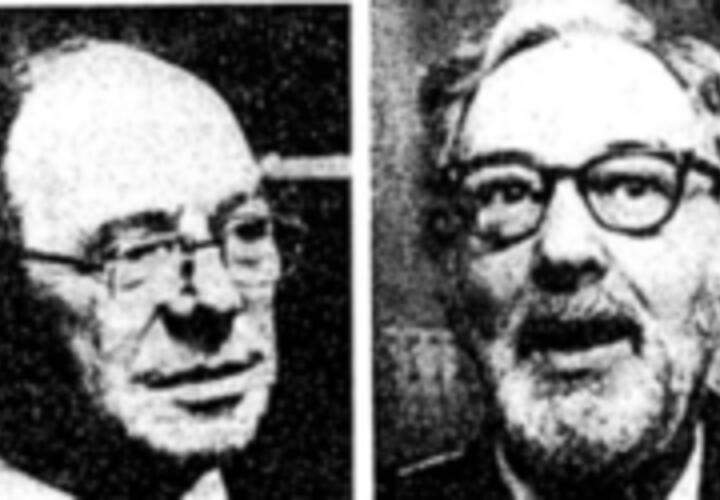Two Economists Win Nobel Prizes
To commemorate Tjalling Koopmans’ Nobel Medal, we take a look back at the October 15, 1975, New York Times article announcing the prize awarded to both Koopmans and Leonid Kantrovovich.
STOCKHOLM, Oct. 14 —Leonid V. Kantorovich of the Soviet Union and Tjalling C. Koopmans of Yale University were named by the Swedish Royal Academy of Science today as co-winners of the 1975 Nobel Memorial Prize in Economic Science.
By The Associated Press.

To commemorate Tjalling Koopmans’ Nobel Medal, we take a look back at the October 15, 1975 New York Times article announcing the prize awarded to both Koopmans and Leonid Kantrovovich. STOCKHOLM, Oct. 14 —Leonid V. Kantorovich of the Soviet Union and Tjalling C. Koopmans of Yale University were named by the Swedish Royal Academy of Science today as co‐winners of the 1975 Nobel Memorial Prize in Economic Science. By The Associated Press. They were cited “for their contributions to the theory of optimum allocation of resources.” The two men, who are to share a $143,000 prize, conducted broadly similar work, largely independent of one another, although with some contact over the last 20 years. The Swedish academy said their work, embracing whole national economies as well as individual corporations and even divisions, had led to improved economic planning. On the practical side, their theories have been applied for such purposes as more efficient transportation, how best to assign men to machines and improved warehousing and storage. Professor Koopmans, a 65year‐old economics professor at Yale, who was born in the Netherlands, said he was “delighted” by the news. Professor Kantorovich, a 63‐year‐old mathematician and member of the Soviet Academy of Sciences, said in Moscow he was “very touched.” Each man praised the work of the other. Dr. Kantorovich said he hoped to be able to travel to Stockholm to receive the award. But Swedish professors expressed concern that Dr. Kantorovich, although not an outspoken critic of the Soviet system, might he caught up in the wake of Kremlin anger over. last week’s award of the Nobel Peace Prize to Andrei D. Sakharov, the dissident. Soviet. Physicist and champion of human rights. The Soviet press had no immediate comment on the economics award. Mr. Sakharov was honored for his militant opposition to official Soviet policy, and Soviet spokesman have condemned the award just as they did when the 1970 Nobel Prize for Literature was awarded to Aleksander Solzhenitsyn. An Indirect Critic. Dr. Kantorovich is an indirect critic of the Soviet economic system although his criticism is couched in mathematical language. He has maintained that a deficient Soviet investment policy has failed to achieve optimum economic growth and has estimated the optimum rate of economic growth at 12 per cent, concept quite contrary to official Soviet economic policy. Both Dr. Kantorovich and Dr. Koopmans started their work by seeking answers to such fundamental questions to all economic activity as what goods should be produced, what. methods of production should be used and how much of current production should be consumed and how much reserved to be invested and create new resources for future production and consumption. “As they have formulated the problems and described the connection between production results and productive inputs in new ways, these two, scholars have been able to achieve highly significant results,” the Swedish academy said. “Early in his research. Professor Kantorovich applied the analytical technique of linear programing to demonstrate how economic planning in his country could be improved,” it noted. “Professor Koopmans for his part, has shown for instance that on the basis of certain efficiency criteria it is possible directly to make important deductions concerning optimum price systems,” the academy. added. Dr. Kantorovich is the first Soviet citizen to receive the economics prize, first awarded in 1969. The prize was set up by the central Bank of Sweden as a memorial in addition to the five original Nobel prizes established by the will of Alfred Nobel, the inventor of dynamite. Winners of Nobel Memorial Prize in Economics. Year Recipient. Nationality. Citation. 1969 Ragner Frisch and Jan Tinbergen Norway Netherlands For their work in econometrics the mathematical expression of economic theory. 1970 Paul A. Samuelson United States For raising the level of scientific analysis in economic theory. 1971 Simon S. Kuznets United States For the empirically founded interpretation of economic growth which has led to deepened insight into economic and social structure of development. 1972 Kenneth J. Arrow and John R. Hicks United States Britain For their pioneering contributions to general equilibrium theory and welfare theory. 1973 Wassily W. Leontief United States For development of the input‐output method and its application to eco‐nomic problems. 1974 Gunnar Myrdal and Friedrich A. Von Hayek. Sweden Britain For their pioneering work in the theory of money and economic fluctuations and their analysis of the interdependence of economic social and institutional phenomena. 1975 Tjalling C. Koopmans and Leonid Kantorosich. United States Soviet Union. States. For their contributions to the theory of optimum allocation of resources.